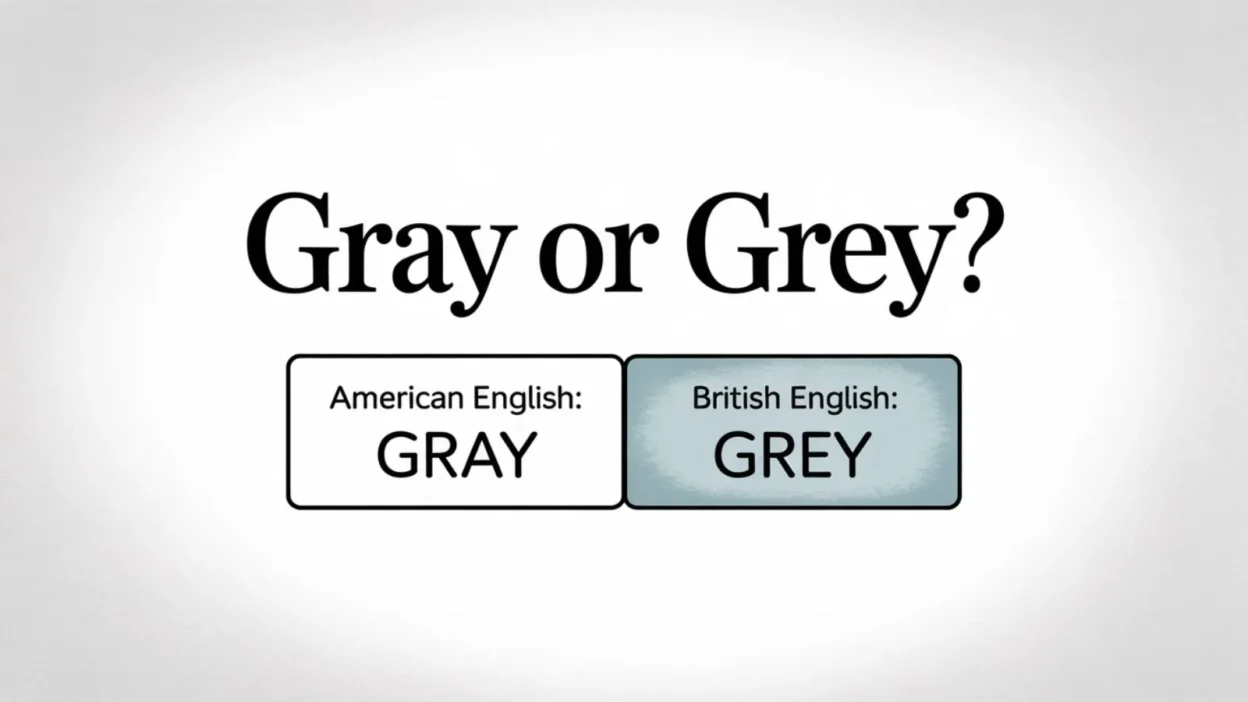Ever typed a word and paused, wondering — is it gray or grey? It’s one of those sneaky spelling questions that even native speakers mix up!
I know the struggle — you just want to sound correct, whether you’re writing an email, blog, or school essay. The good news? You’re not alone, and the answer is simpler than it looks.
In this guide, I’ll break down exactly when to use gray and when to use grey, depending on where you live and who you’re writing for.
By the end, you’ll remember the rule effortlessly — every single time you write it!
⚡ Is It Gray or Grey? – Quick Answer
Both spellings are correct.
Gray → Preferred in American English.
Grey → Preferred in British English and Commonwealth countries (Canada, Australia, India, etc.).
Examples:
🇺🇸 US: “The sky looks gray before a storm.”
🇬🇧 UK: “The sky looks grey before a storm.”
🕰️ The Origin of Gray or Grey
The word comes from Old English grǣg, meaning the color between black and white.
Over centuries, spelling evolved differently in regions.
- Noah Webster’s American Dictionary (1828) pushed for simplified spelling in the US, making gray standard.
- In the UK, the older spelling grey remained dominant.
🌍 British English vs American English Spelling
Spelling rules often differ across the Atlantic. Gray/grey is one of the most famous examples.
| Region | Preferred Spelling | Example Sentence |
|---|---|---|
| United States | Gray | The kitten has gray fur. |
| United Kingdom | Grey | The kitten has grey fur. |
| Canada | Grey (mostly) | The colour grey is calming. |
| Australia | Grey | He wore a grey suit. |
🧭 Which Spelling Should You Use?
- Writing for US readers? Use gray.
- Writing for UK or Commonwealth readers? Use grey.
- Writing for a global audience? Either is fine, but stay consistent.
💡 Tip: If unsure, match your spelling to the dictionary style of your audience.
⚠️ Common Mistakes with Gray or Grey
- Mixing both spellings in one document → looks unprofessional.
- Autocorrect issues → software may change your spelling depending on language settings.
- Confusing with other words:
- Graying hair (US) vs greying hair (UK).
- Gray area vs grey area.
✉️ Gray or Grey in Everyday Examples
- Emails: “Please find the gray/grey report attached.”
- News: US papers: gray skies, UK papers: grey skies.
- Social media: Both spellings appear, depending on the poster’s location.
- Formal writing: Match your spelling to the chosen style guide (APA, MLA, Oxford, etc.).
📊 Gray or Grey – Google Trends & Usage Data
Search data shows:
- Gray dominates in the US.
- Grey dominates in the UK, Canada, Australia, and India.
| Country | Most Popular Form |
|---|---|
| United States | Gray |
| United Kingdom | Grey |
| Canada | Grey |
| Australia | Grey |
| India | Grey |
FAQs About Gray vs Grey ❓
Q1: Which is correct, gray or grey?
✅ Both are correct; it depends on where you’re writing.
Q2: Is grey British spelling?
🇬🇧 Yes, grey is standard in the UK and Commonwealth countries.
Q3: Why do Americans use gray?
📘 Noah Webster promoted simplified spellings, making gray common in the US.
Q4: Is there a difference in meaning between gray and grey?
🎨 No. They both describe the same color.
Q5: Can I use either in formal writing?
✍️ Yes, but stay consistent throughout your work.
Q6: Which is used more worldwide?
🌎 Grey is slightly more common globally, but gray dominates in the US.
Q7: What about phrases like “gray area”?
🗂️ Both spellings work—just match your regional style.
🏁 Conclusion
So, is it gray or grey? The answer is simple: both spellings are correct.
Gray is the American standard, while grey is the British and Commonwealth preference.
The meaning doesn’t change, but the spelling signals where you’re writing from—or who you’re writing for.
If your audience is American, stick to gray. If your readers are in the UK or Commonwealth, use grey. For international work, pick one spelling and use it consistently.
Next time you face this choice, you’ll know exactly which version to write—with confidence.

I’m Emma Collins, a grammar expert and author at Grammarnestly.com. I love helping readers master English with simple, practical grammar guides.
When I’m not writing, I enjoy reading, coffee, and exploring the beauty of language.



